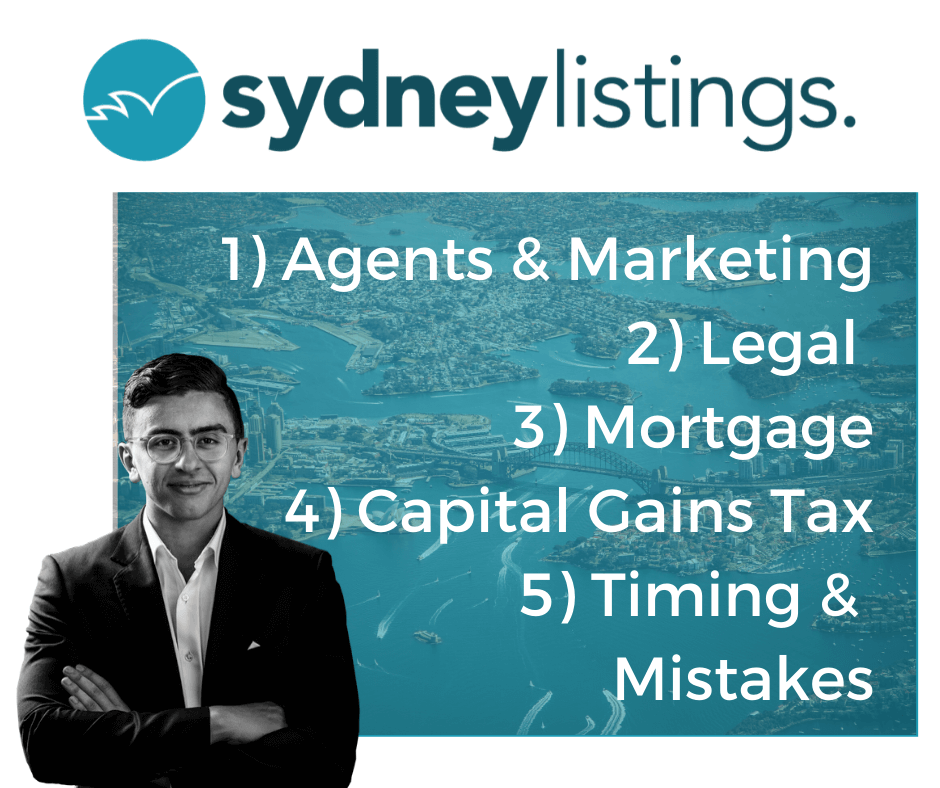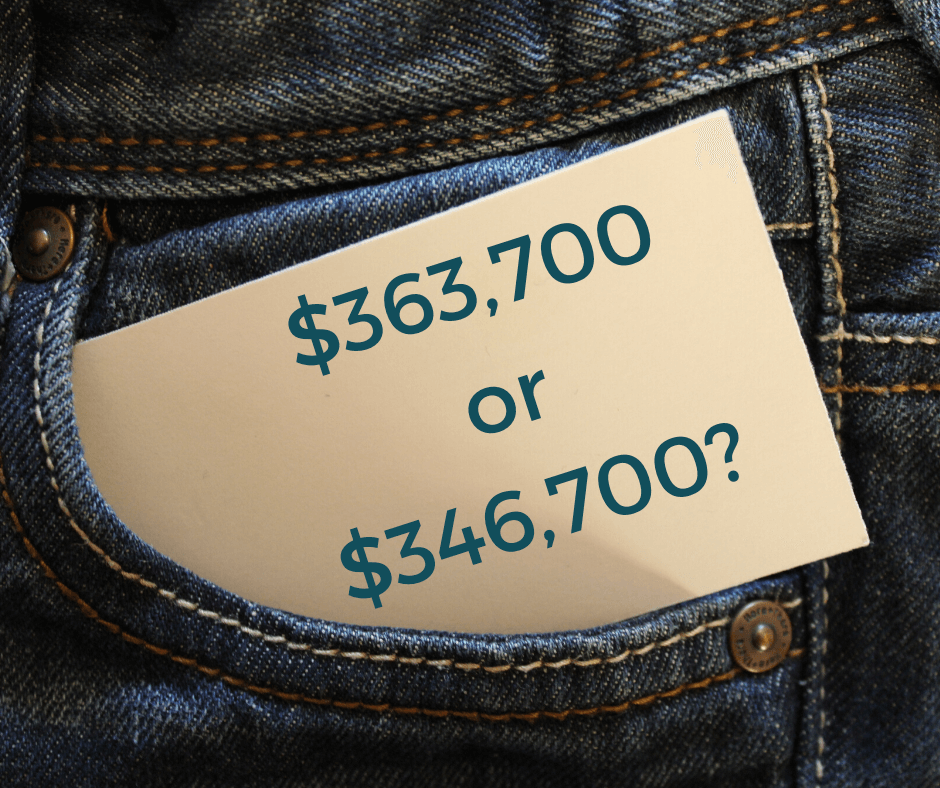“Joe, I know you can sell my house for big bucks, but how much of that is actually going to end up in my pocket? How much money can I keep when I sell my home?”
The real estate process can be a bit confusing. It is not the most transparent transaction, and that’s why our mob here at Sydney Listings wanted to unpack for you very clearly how much you get left with when you sell.
We’re going to talk about 5 big costs or factors that come out of that final sales price, and then you can go and easily run your own numbers to understand what you’re going to be left over with once you cash in!

Agents & Marketing Costs
This is the big and obvious one. The real estate industry in Sydney is still dominated by a commission model.
So, an agent will charge on average 2% + GST of your final sale price. Some agents charge up to 3%.
So if you were selling a $1 million property the average agent’s fee would be $20,000 + GST.
BUT this is not the full picture because in Australia marketing expenses to the seller are charged separately to and on top of commission.
Marketing expenses include:
- Brochures
- Photography
- Signboards
- Video
- Advertising on listing portals like realestate.com.au and domain.com.au
- and more…
How much is this? Well in some areas it can be as low as $4-5,000, and in premium suburbs it can be up to $25-30,000.
Don’t have a heart attack just yet! Use an average range of $4-7,000 for now for a ‘run-of-the-mill’ property sale. So you’re looking at $27,000 in agent and marketing fees on a $1 million property.
There’s currently $973,000 sitting in your pocket if you use a traditional agent.
Reducing Selling Costs in order to keep more money when you sell your home
Now if you’ve seen our wacky “ARREST THE AGENT” campaigns you know that there are alternatives out there. Agents at Sydney Listings are currently able to sell homes for $9,999 in any area without compromising on service.
(Bloody impressive isn’t it).
Now obviously I recommend this but I’m not exactly impartial. There is innovation happening in real estate and there will be benefits passed on to customers as a result.
As always, whether you go with the old fee model or an updated one like ours you need to be comfortable that you’re getting a good service. If you need to know more about our solution, there’s details here.

But now let’s get back to your pocket. With a modern agent you could actually have $990,001 left in your pocket, rather than $973,000.
“Thanks Joe” you’re all saying.

Legal Costs
Often overlooked but in Australia legal professionals are an important part of the sales process.
To organise the property to be sold you will need conveyancing done – this is the legal work required in creating the contract, mortgage and other important documents for the sale.
In other words, all the BORING stuff so that us agents don’t have to do it!
If you’ll take another Sydney Listings tip, we recommend you always use a SOLICITOR who does conveyancing rather than just a stand-alone CONVEYANCER even though it is slightly more expensive.
The reason is that if there is legal trouble, the solicitor will be able to advise you and handle matters whereas the conveyancer will not.
Allow around $1,650 plus disbursements for a good conveyancer.
In your pocket at this point: $988,000 vs. $971,000 from that $1 million sales price.
Mortgage
Most of you will have a mortgage to pay out on your property and so you will need to clear any outstanding debt with the proceeds of the sale.
Your lender will get cross with you and put you in the naughty corner if they don’t get their money. So the lender ensures that they get paid first before you settle.
So if you have $600,000 of debt outstanding on your property sold for $1 million, you’ll have somewhere between $388,000 and $371,000 in cash left over.
Now this REA article paints a clear picture about implications with your mortgage. If the value of your property has gone down or is less than the outstanding debt, you may be in the dangerous region called negative equity.

For example, if the debt owing was $1.2 million, and you sold for $1 million… well you don’t need to be a mathematician (though if you’re not, you’re $200,000 short) to know the bank will not be happy.
In this instance, the lender will actually take steps to recover their debts before allowing the settlement to go through.
The other time a lender can get involved in holding up your settlement is if you’ve cross-collateralised two loans together. You don’t need to know about that right now as it’s getting complicated but if this affects you, you can learn more here.
Capital Gains Tax.
Capital Gains Tax is the tricky one out of this bunch. Most people will factor in the direct costs from the agent and the mortgage owing but neglect Capital Gains Tax (othewise known as CGT).
Whilst we refer to CGT you don’t actually pay it separately, you just pay it as part of your normal tax. That is, it is considered alongside the rest of your income. So keep that in mind, it is dependent on your overall position.
To help explain it for Australia I thought this was the clearest video online for you visual learners: although it uses a shares example.
The simplest and clearest blog article I believe for you is this one from HR Block !
Capital Gains Tax (CGT) applies more to investors than owner-occupiers.
You are actually exempt from CGT in Australia under the following conditions:
- The property was purchased before 1985 (as this is when the legislation was introduced)
- The property is your Principal Place of Residence, and not a pure investment property
We then get into another headache about whether a property qualifies as a principle place of residence or not. I was trying to help a friend figure out if they were exempt recently – you should see how much time and research they put into this rabbit hole!
Gee tax is fun!
It may not be necessary to open this whole essay here, but in short:
- There is not absolute clarity from the ATO on the criteria for a principal place of residence (PPR for short)
- You can only have one PPR, unless you sell and start the process again.
- There are extra implications if you have lived overseas in this time … see here
- Just because a property collects rent doesn’t mean it can’t qualify as your PPR, as long as you lived in it for a period (although this period is somewhat vague)
- The HR Block Blog suggests you can still claim exemption for a property if you relocate due to medical or disability reasons to a care facility instead of living there.
- CGT is higher if the asset is sold within 1 year.
How do I figure out what my CGT amount is?
The obvious answer to this question “How do I figure out what my CGT amount is?” would be to “ask your accountant”.
BUT if interested, Michael Yardeny from Property Update outlines three methods and they are based on timing and circumstances of the sale.
There are also calculators you can use online to get a rough indication of CGT but remember that this is not as precise as using an accountant.
Using this calculator, an example of a property bought for $875,000 which is sold 2 years later for $1 million, by an investor earning a $90,000 a year salary with no other income would be approximately $24,375. But if sold within 12 months, the CGT payable is estimated to be more than double at $51,550.
Big difference there of $27,175.
Say we’re using the 2 year example, there’s now either $363,700 or $346,700 remaining, again depending on that agent choice.

The total non-mortgage costs of exiting the property so far are $36,000 vs. $52,950 for the example we used. Just note that these will constantly change based on the situation!
Timing and Mistakes
Don’t forget that the market value changes over time, going up and down and may be different from when you start looking to sell from when you eventually get on the market.
Don’t be surprised if the scenario is very different within 4-6 months! Which is why you should regularly appraise the property with agents as well as through self-education ever 6 months when you’re thinking of selling.
If you need more advice on how to time the right point sell, go here.
Also, using the wrong professionals, be they accountants, agents, solicitors or mortgage brokers can cost you more. Being strategic about the sale and getting the right professionals around you can help you maximise how much money you keep when selling.
What will the cost be if your loans are set up incorrectly and your lender won’t release the security?
What will the cost be if your accountant cannot claim exemptions from CGT?
What will the cost be if there is a mistake in your contract of sale?
Could the wrong agent cost you up to $80,000 just because they’re not a skilled negotiator?
Good Luck and don’t forget to share this article with people who might find it useful!


Leave a Comment